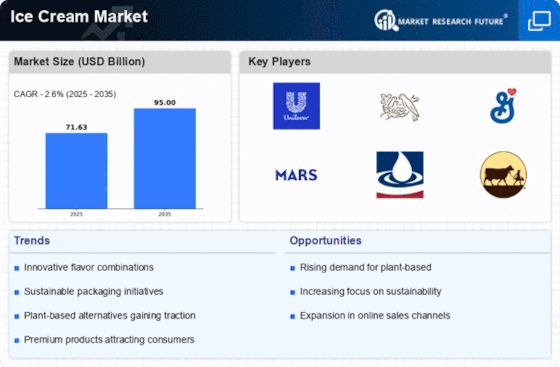Top Industry Leaders in the Ice Cream Market

The Ice Cream Market is a thriving and competitive segment within the global dessert industry, featuring a mix of established players, innovative strategies, market share determinants, emerging companies, industry news, investment trends, and an overall competitive scenario.
Key Players:
Nestlé S.A.
Unilever
General Mills Inc.
Mars Incorporated
Gujarat Cooperative Milk Marketing Federation Ltd
Lotte Confectionery Co., Ltd
Amy's Ice Cream
Jude's Ice Cream
Wells Enterprises, Inc.
Blue Bell Creameries
Strategies Adopted:
To navigate the dynamic landscape of the Ice Cream Market, key players deploy diverse strategies that cater to evolving consumer preferences and market trends.
Product Innovation: Key players focus on continuous product innovation to introduce new flavors, formulations, and formats. This strategy aims to capture consumer interest, drive repeat purchases, and maintain a competitive edge in a market driven by novelty.
Health and Wellness Emphasis: With a growing focus on health and wellness, major ice cream manufacturers invest in producing healthier alternatives. This includes the development of low-fat, sugar-free, and dairy-free options to cater to health-conscious consumers.
Partnerships and Collaborations: Strategic partnerships with other food and beverage companies or local brands enable key players to expand their product reach and market presence. Collaborations often result in limited-edition flavors or co-branded products that generate excitement among consumers.
Market Expansion: Global market expansion remains a key strategy for major players. Establishing a strong presence in emerging markets and adapting products to suit local tastes and preferences contribute to sustained growth.
Market Share Analysis:
Several factors influence market share dynamics in the Ice Cream Market, reflecting the competitive nature of the industry.
Brand Loyalty: Consumer loyalty plays a pivotal role in determining market share. Brands that successfully build and maintain strong connections with their customer base benefit from repeat business, positive word-of-mouth, and increased market share.
Distribution Network: The extent and efficiency of a company's distribution network impact market share. Widespread availability through supermarkets, convenience stores, and partnerships with local retailers contribute to market dominance.
Pricing Strategy: Competitive pricing strategies, including promotions, discounts, and bundle offers, directly influence market share. Brands that strike a balance between quality and affordability tend to attract a broader consumer base.
Consumer Preferences: Understanding and adapting to changing consumer preferences, whether related to flavors, ingredients, or dietary considerations, is critical for maintaining and growing market share.
News & Emerging Companies:
In the ever-evolving Ice Cream Market, news often revolves around emerging companies introducing novel concepts, flavors, or production methods that disrupt traditional norms.
Emerging companies frequently focus on addressing specific consumer demands, such as plant-based options, sustainable packaging, or unique flavor profiles. These companies contribute to market dynamism by challenging established norms and injecting innovation.
Industry Trends:
Investment trends within the Ice Cream Market underscore the industry's response to evolving consumer expectations, technological advancements, and sustainability concerns.
Plant-Based Innovations: Significant investments are directed toward developing and expanding plant-based ice cream alternatives. This includes investments in research and development to enhance the taste and texture of non-dairy options.
Sustainable Practices: Industry players are increasingly investing in sustainable and eco-friendly practices. This involves reducing carbon footprints, adopting recyclable packaging, and sourcing ingredients responsibly to align with environmentally conscious consumer values.
Digital Marketing and E-Commerce: Investments in digital marketing strategies and e-commerce platforms are on the rise. With changing consumer behaviors, companies seek to capitalize on online channels to enhance brand visibility, engage with consumers, and drive sales.
Competitive Scenario:
The Ice Cream Market is characterized by a highly competitive landscape where key players engage in a constant battle for consumer attention and loyalty. The balance between meeting traditional preferences and adapting to contemporary trends shapes the overall competitive scenario.
Recent Development
The Ice Cream Market was the widespread adoption of blockchain technology for supply chain transparency. Major players began implementing blockchain to trace the journey of ingredients from source to final product, addressing consumer concerns about the authenticity and quality of ingredients. This development emphasizes the industry's commitment to transparency and quality assurance, catering to a consumer base increasingly interested in the provenance of their food.











